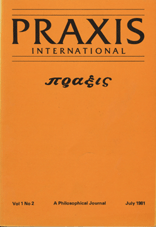The Problem of Freedom: Fromm's Contribution to a Critical Theory of Work Organisation
The Problem of Freedom: Fromm's Contribution to a Critical Theory of Work Organisation
Author(s): David Knights, Hugh WillmottSubject(s): Philosophy
Published by: Blackwell Publishing Ltd
Summary/Abstract: Most studies in the field of work and industrial relations neglect or trivialise the significance of problems of freedom, and relatedly of meaning and identity, for the reproduction of economic organisations. For example, in Goldthorpe et al.'s The Affluent Worker (1968), the responses of employees who reported satisfaction with intrinsically unrewarding work are theorised primarily as a function of privatisation rather than grasped as an expression of resignation or acquiescence to a position of political and economic dependence. The basic limitation with this kind of middle-range theorising is that it moves from the concrete or particular, in the form of employees' responses to researchers' predetermined questions, to the abstract or universal, in the form of instrumentalism as a prevalent orientation to work. So doing, the way in which employees' vocabularies of motive (Mills, 1967) are developed and articulated dynamically in relation to their existential concerns and structural position is all but disregarded. Moreover, in focussing upon workers' expressed orientations, to the neglect of the fashioning of these orientations within specific psycho-social contexts, it leaves unchallenged the conventional wisdom that the interests of 'instrumental' workers are best served by forms of work organisation that offer 'high' wages but provide no real or controlling involvement in the processes of organisational decision-making, design, and development. Hierarchical, non-participatory, non-democratic forms of work organisation are thereby legitimated 'from below' insofar as they are shown to satisfy the material self-interests of employees (Habermas, 1971).
Journal: PRAXIS International
- Issue Year: 2/1982
- Issue No: 2
- Page Range: 204-225
- Page Count: 22
- Language: English

